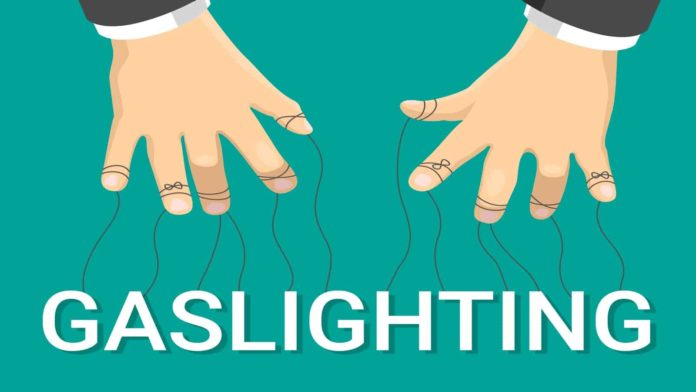Gaslighting is a form of psychological abuse or manipulation performed by either one person or a group of people to assert dominance over another. It is the act of manipulating the other person by forcing them to question their thoughts, memories, or the events happening around them. Whether it is done intentionally or not, it is a type of emotional abuse that is often seen in relationships that are described as abusive.
Gaslighting victims often go-ahead to question their own sanity when pushed too far as the action wreaks havoc on their minds. This can be seen in the movie titled Gaslight (1944) where the term originated from. The devious husband in the story manipulates and torments his wife to convince her she’s going mad. He purposely dims their gas-fueled lights and tells her she is hallucinating.
Marriages and romantic relationships are not the only types of relationships where gaslighting can occur. It can happen with bosses, friends, and parents, however, it is most devastating when it occurs in a relationship between a couple. The use of gaslighting phrases in a marriage or relationship can make the whole experience very toxic, making it emotionally harmful for the individual.
Below are Gaslighting Phrases That Can Ruin a Relationship
1. “Do Not Take These Things Too Seriously”
In a bid to make you feel otherwise and second guess your feelings, a gaslighter will use such phrases that will prompt you to disregard something that emotionally troubles you.
2. “Don’t Make Such A Big Deal Out Of Something Small and Irreevant”
This phrase is an example of a situation where a gaslighter chooses to become defensive before trivializing the issue that is being brought up by their partner.
3. “Stop Exaggerating The Situation”
When a gaslighter uses this phrase, they are trying to put down their victim’s rational capabilities, considering it to be trivial and exaggerated. This enables them to easily brush aside all that you say.
4. “You Do Not Remember What Happened Correctly”
This is a typical example of when a gaslighter accuses their victim of memory loss. They attack their victim’s neurological sanity, coercing them into remembering the situation differently even though they know what they remember is correct. As a result of this, the victim is unable to further present their viewpoint, succumbing to their abuser.
5. “You Keep On Overthinking These Things”
A gaslighter may use this phrase to avoid further speculation into a situation. By saying this, they get the victim to believe that when they attribute their problems or concerns to overthinking, they are able to let go of them. They further buy into the idea that when they stop overthinking, they are able to preserve their mental health, thus allowing their abuser to think for them.
6. “It Will All Go Away If You Just Forget About It Right Now”
If one frequently chooses to avoid their problems by trying to forget about it, these problems do not actually disappear as a gaslighter will want their victim to believe. All it does is push the issue at hand aside for the time being. While the victim might appear to be able to move on, a part of that issue stays with them subconsciously and this can affect their long-term thought process and relationship with other people.
7. “I Think You Should Get Some Help”
This is a clear example of when a gaslighter attributes a mental health issue to their victim. In some cases, the use of this phrase might come off as a genuine concern but when used in a manipulative manner, self-doubt begins to creep in and a distraction is created from the true objective of the abuser’s activities.
8. “That Did Not Happen”
While it may appear to be inconsequential, this phrase can lead to one losing their mind as it questions their sense of reality. It is an outright example of emotional abuse when used often.
9. “Stop Imagining Things”
This is one of the most dangerous and commonly-used gaslighting phrases. Almost similar if not even worse than the above-listed phrase, the use of this phrase by a gaslighter can cause serious cognitive dissonance in the victim and even make them feel borderline insane as they begin to doubt their own beliefs and opinions.

10. “Stop Blaming Me, It Was Never My Intention”
When a gaslighter does not feel the need to further explain their actions, they use such a phrase that deflects the issue. This can be categorized as a defensive type of gaslighting phrase.
11. “Stop Being So Insecure”
This is an outright example of the type of phrase a gaslighter would say to their partner in a romantic relationship. It is very common. A gaslighter will always choose to bring up their victim’s insecurity whenever a concern is raised. They target their partner’s feelings instead of evaluating their own behavior so that at the end of the day, they can go without any blame.
12. “Can’t You Take A Joke”
This gaslighting phrase can happen in not just a romantic relationship but also in a child-parent relationship and in an institution. The abuser here suggests wrong and hurtful things about their victim and later calls it a harmless joke when it upsets you. They do this in order to avoid apologizing for their wrongdoing.
13. “Isn’t This Just You Being Paranoid”
This phrase is another example of when a gaslighter refuses to accept that they have been caught doing something devious. They instead choose to turn things around by playing it off as their victim being paranoid.
14. “You Are Wrongly Interpreting My Intentions”
Just like the example phrase above, an abuser may use this phrase to deflect responsibility from themselves. By considering the problem to have come from a misunderstanding, the victim will have no option but to divert their attention to other things as the abuser does not have to take responsibility for it.
15. “You Are Always Very Emotional”
One of the most common phrases used by a gaslighter entails them showing their lack of empathy by telling their victim that they are being emotional. This allows them not to own up to their actions as they make their victims wonder if they have been overreacting to the situation even though it might have been justified.
16. “There Is Sincerely Nothing To Be Jealous About”
This occurs when the gaslighter enjoys the feeling of dependency in a relationship. As a result, they deliberately make their victim feel jealous in order to have a sense of importance and control while disregarding the hurt they might be causing.
17. “Please Stop Being Dramatic”
Like a few others that are on this list, this gaslighting phrase is used by an abuser who wants to play down their victim’s feelings.
18. “I Am Not The Problem Here, You Are”
Likened to a form of psychological torture, this gaslighting phrase is used when an abuser is trying to project their own problematic issues onto their victim. The victim is then forced to question themselves and would probably never make an issue out of a situation where they are not the ones at fault.
19. “You Are Making Things Up”
Here is an example of a statement a gaslighter will make to completely deny the way you feel. This can end up forcing you to change your own perception.
20. “You Do Not Have Any Emotional Security”
In addition to this gaslighting phrase being very hurtful, it is also downright rude. It is an example of a defensive approach to gaslighting but it has huge devastating effects.
21. “As Soon As I Get So Old That I Can’t Take Care Of Myself, Organize To Have Me Killed Because I Know You Won’t Take Care Of Me”
Most likely used in a romantic and personal relationship, this gaslighting phrase is a classical example of emotional blackmail used to foster control.
22. “Why Do You Always Have To Argue With Me”
In a situation when a victim proves to be a hard nut to crack for their abuser, i.e they often challenge their abuser’s authority, calling out their lies, inaccuracies, red flags and stopping them in their tracks when they go about their usual activities of gaslighting, this is an example of the type of phrase they may likely use. This is because you are clashing with their narrative too much and speaking up.
23. “Show Me Some Respect”
With this phrase, a gaslighter who would typically be a man or just an older person is trying to imply that their victim should not question their actions or statement. They do this to downplay whatever concerns that their victim might have brought up.
24. “I Had It Much Worse Than You”
This phrase is used by abusers to shut up victims and let them know that they have no right to be upset about their situation.
25. “You Are Crazy And I Am Not The Only One Who Thinks So”
After years of lying and distorting their victim’s reality, eroding their confidence along the way, a gaslighter may use this phrase to further make their victim question their own sanity.
The Kinds of Relationships Where Gaslighting Occur
1. Intimate and Romantic Relationships: These are voluntary relationships between two individuals who have intentions of being significantly involved in the life of the other. This relationship is an interpersonal one and involves physical and/or emotional intimacy.
Gaslighting may occur in this relationship when one tries to control the other. They may accuse them of being irrational or crazy in order to isolate them, undermine their confidence, and ultimately make them easy to control.
2. Child-Parent/Caregiver Relationship: Abusive caregivers, and even parents themselves, may use gaslighting as a way to control children. They do this by shaming them and accusing them of being too sensitive, thus belittling their feelings.
3. Medical Practitioner/Patient Relationship: Gaslighting between a medical professional and a patient may occur when a patient’s health concern is dismissed based on the assumption that they are mentally ill. For example, they could use phrases like “the symptoms are in your head.”
4. Institutional Gaslighting: Institutional gaslighting occurs at a company or organization between management and staff. The organization may deny or hide information, lie to employees about their rights, or portray those who uncover problems within the organization as incompetent or having ulterior motives.
5. Racial Gaslighting: Racial gaslighting occurs when gaslighters apply gaslighting techniques to people based on their race or ethnicity. An example of this is when civil rights activists are criticized for being too emotional. This is done as a way to undermine their complaints and message.
6. Political Gaslighting: Quite similar to racial gaslighting, political gaslighting occurs when politicians downplay or hide things they have done wrong. They lie, deny, and manipulate information to control people. They even go as far as using controversy to divert attention from important events and discredit political opponents for being emotional or mentally unstable.

Ways Through Which People Gaslight Others
Gaslighters often know your sensitivities and vulnerabilities and use that knowledge against you. As already mentioned, they make you question your perception, doubt yourself, your judgment, and then your sanity. To do this, there a few techniques they employ that often develop gradually, making it difficult for a person to detect. Some of these techniques include:
1. Trivializing: This happens when the gaslighter disregards the feelings of the other person. They do this by accusing them of overreacting or being too sensitive when they actually have concerns that are valid.
2. Diverting The Scope of Discussion: Here, a gaslighter chooses to question their victim’s credibility instead of focusing on the actual discussion and whatever issues were raised. They brush off whatever concerns you may have by attributing your ideas to something that was gotten from the internet, a life lesson book, or friends.
3. Withholding: Here, they withhold by refusing to engage in a conversation. A gaslighter using this technique will pretend not to understand what their victim is saying so that they do not have to respond to them.
4. Denial: A blatant denial in the face of proof is one of the more common ways through which people gaslight others. They do this by pretending to forget events or how they occurred. They could also deny having done something, said something, or accuse their victim of making things up. This is done to get you to doubt the proof that you have and also possibly disrupt your perception of truth and reality.
An example of this could be when one person is assigned to take out the trash at the end of the day. This person does not do this but when accused of neglecting their role the following day, they insist they did it even though the person accusing them of neglecting the role was the one who took out the trash.
5. Stereotyping: A gaslighter may also intentionally use negative stereotypes of their victim’s identity (gender, race, ethnicity, sexuality, nationality, and age) to manipulate them. Examples of this may include when they tell a female that people will think she is irrational or crazy because of her menstrual cycle.
6. Telling White Lies: Another way to detect when someone is gaslighting you is when they tell you a white lie that you are very sure to be false. Ensure that you do not confuse a blatantly untrue statement for a confused inaccuracy as there is a difference between the two.
An example of a confused-inaccuracy can be when the name of the writer of the Harry Potter novels may be mistaken to be another person other than J.K Rowling. A white lie in this instance will be when you know J.K Rowling is your favorite writer because of the Harry Potter novels but someone else insists that you have repeatedly told them your favorite writer is Tom Clancy.
7. Manipulating Your Feelings Towards Other People and Things: A gaslighter will try to eliminate competition for your love and attention by twisting the way you feel about people or things you love. They can go as far as convincing their victim that everyone is a liar and are not looking out for their best interest. This will ensure that their victim becomes heavily dependant on them.
Pointers That Indicate You May Be a Victim of Gaslighting
There are more than a few signs you can look out for within yourself that would indicate to you that you are a victim of gaslighting. Author of the book, The Gaslight Effect: How to Spot and Survive the Hidden Manipulation Others Use to Control Your Life, Dr. Robin Stern, listed some of these signs in his book that shines a light on the effect of gaslighting and how to “gasproof your life” so you’ll avoid a gaslighting relationship. These signs include:
- When you feel confused and constantly second-guess yourself
- When you feel like everything you do is wrong
- When you have a feeling that something is wrong but are unable to identify what it is
- When you find yourself apologizing often
- When you no longer feel like the person you used to be
- When you are overcome by the feelings of hopelessness, joylessness, worthlessness, and incompetence and take little to no pleasure in activities you used to enjoy
- When you begin to find it increasingly hard to make decisions on your own
- Become more anxious and less confident than you once were
- Always thinking and believing it is your fault when things go wrong
- When you often question your sensitivity by wondering if you are being too sensitive
- Become withdrawn and unsociable
- Often lying to family and friends to avoid having to make excuses for them
- Often make excuses for the behavior of your gaslighter
- Find yourself to be isolated from friends and family
Actions To Take If You Find Yourself To Be A Victim of Gaslighting
Author of The Emotionally Abusive Relationship, Psychotherapist Beverly Engel, writes that the antidote to gaslighting is becoming more self-aware. “The better you know yourself, the better you will be at fending off inaccurate statements about yourself.” Many will, however, admit that no matter how well you know yourself, it will be very hard for one to pull themselves out of an abusive relationship if they have been in it for so long. Regardless, there are a few steps that can be taken that will generally help.
1. Always Call Out Their Behavior: Whenever you feel like you are being gaslighted, do not hesitate to call out your abuser’s behavior. Let them know that you can see their manipulative game and would not just lie down and take it. While this is a good step in the right direction, it should be understood that things would not change overnight. The fact that a victim calls out their abuser does not mean that they would immediately change their behavior. As a result, it is something that you should be prepared to do for a long while.
2. Do Not Stop Paying Attention To Your Guts: The aim of gaslighting is to erode your confidence to the point that you no longer trust yourself and your instincts. You should never let this happen, instead, always pay attention to whatever you feel. If deep down you feel something is wrong, do not dismiss it because someone else directs you to do so. Rather, thoroughly investigate these feelings before making another move.
3. Keep Evidence: When you keep tangible evidence (text, mail, conversation notes, etc) of your abuser’s abusive behavior, you can use it to combat the confusion they try to create with their gaslighting phrases.
4. Speak To A Trusted Person: If you find yourself to be a victim of abuse, you are advised to speak to a therapist as soon as possible in order to get professional advice. You may also choose to speak to a close friend or relative to understand if they have been in the same situation you find yourself in and how they may react or behave towards a gaslighting partner.

Summary
Since it causes someone to doubt their sanity or perception, gaslighting qualifies as a form of abuse. It can happen between colleagues, friends, family, or in a romantic relationship where lies are purposely used to confuse a person about their own mental state with the aim of ultimately control them. One can be able to tell that they are being gaslighted when someone keeps blaming them or is overcritical about what they do.
Can Gaslighting Occur Unintentionally?
Yes, it can. Some of the examples of gaslighting phrases have been said by many of us unintentionally and without malicious intent but will still have had the same effect as when it is said intentionally.
